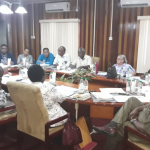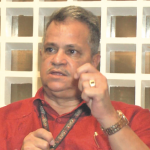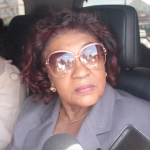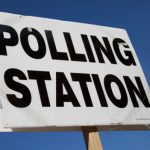
Attorney General and Minister of Legal Affairs, Anil Nandlall took the stand at the Elections Commission of Inquiry today and testified that in the lead up to the 2020 Elections, the then Chief Elections Officer, Keith Lowenfield had made a number of decisions that could have placed supporters of the People’s Progressive Party Civic (PPP/C) at a disadvantage.
Mr Nandlall served as an Assistant Party Agent for the PPP/C responsible for the East Coast of Demerara from Industry to Cane Grove during the last elections.
Putting the issue into context, the Attorney General said GECOM had long established a policy document detailing the guidelines for the allocation of polling stations across the country.
He said of importance, the Elections Commission had cautioned against the use of private residences as polling places, except for rare circumstances where a community or village may not have a public building available for use.
He said although the East Coast was short on public buildings, the CEO took a decision to assign polling outside of many villages, thereby putting its supporters at a disadvantage.
“GECOM by the location of some of these polling places, and the way they structured or rather assigned list of electors to these polling places, when we checked it on the ground, it translated into PPP stronghold areas being requested to come out of those villages and vote in other villages, which are not traditionally considered to be PPP stronghold villages,” the Attorney General explained.
Nandlall testified that the decision was of major concern for the PPP/C.
But he noted that in Central Georgetown, which is historically known as the stronghold for the People’s National Congress Reform (PNCR), the then CEO assigned polling places at private residences, when there were more than enough public buildings.
“Georgetown being the capital city, an urban centre, obviously would have a large number, and does have a large number of public buildings, yet I was able, and my other political colleagues were able to photographed many private residences being allocated or identified as polling places in Georgetown,” the Attorney General explained.
According to Minister Nandlall, though the issue was brought to the attention of the CEO on several occasions, it was only addressed some 72 hours before the March 2 Elections with the support of two Commonwealth Election Experts.
“In fact I recall distinctly 72 hours before polling day we were in certain communities in the night, looking for spots, empty lots, to locate tents on Elections Day so that people can vote because there was no public buildings and they maintained that they were not going to use private residence,” he explained.
Earlier on in his testimony, he told the Commission that though the No-Confidence Motion was successfully brought before the APNU+AFC Government on December 21, 2018, elections were not called until December, 2019, following a number of Court cases.



















You must be logged in to post a comment Login